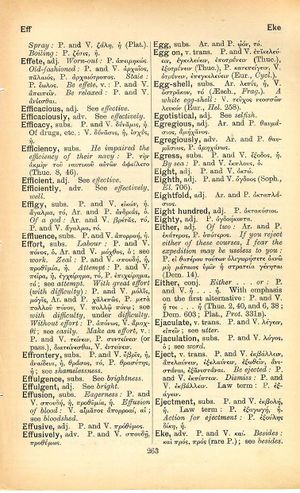either: Difference between revisions
From LSJ
δι' ἐρημίας πολεμίων πορευόμενος → he marched on without finding any enemy, his route lay through a country bare of enemies
(Woodhouse 2) |
(CSV4) |
||
| Line 1: | Line 1: | ||
{{ | {{Woodhouse1 | ||
| | |Text=[[File:woodhouse_263.jpg|thumb|link={{filepath:woodhouse_263.jpg}}]]'''adj.''' | ||
<b class="b2">Of two</b>: Ar. and P. [[ἑκάτερος]], P. [[ὁπότερος]]. | |||
<b class="b2">If you reject either of these courses, I fear the expedition may be useless to you</b>: P. εἰ θατέρου τούτων ὀλιγωρήσετε ὀκνῶ μὴ [[μάταιος]] ὑμῖν ἡ [[στρατεία]] γένηται (Dem. 14). | |||
'''conj.''' | |||
<b class="b2">Either . . .</b> or: P. and V. ἢ . . . ἤ. | |||
<b class="b2">With emphasis on the first alternative</b>: P. and V. ἤ τοι . . . ἤ (Thuc. 2, 40, <b class="b2">and 6, 38</b>; Dem. 603; Plat., ''Prot.'' 331B). | |||
}} | }} | ||
Revision as of 09:37, 21 July 2017
English > Greek (Woodhouse)
adj.
Of two: Ar. and P. ἑκάτερος, P. ὁπότερος. If you reject either of these courses, I fear the expedition may be useless to you: P. εἰ θατέρου τούτων ὀλιγωρήσετε ὀκνῶ μὴ μάταιος ὑμῖν ἡ στρατεία γένηται (Dem. 14). conj. Either . . . or: P. and V. ἢ . . . ἤ. With emphasis on the first alternative: P. and V. ἤ τοι . . . ἤ (Thuc. 2, 40, and 6, 38; Dem. 603; Plat., Prot. 331B).

